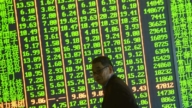【新唐人2012年9月29日讯】房地产一直是扰动中国经济起落的不稳定因素,高房价是中国经济最大的泡沫,中国楼市像一个烫手山芋,下一届的领导班子会怎么接?我们来听听专家怎么说。
《路透社》财经分析专栏对中国的楼市提出问题,报导说中国房地产调控像个烫手山芋, “紧”将拖累经济, “松”则引发民怨,对中国将上任的十八大新一届政府而言,调控到何种温度,才能消除泡沫又不致过度伤及经济? “限贷、限购”又能持续多久?
美国“南卡罗莱纳大学艾肯商学院”教授谢田认为,中国房地产造成今天烫手的状态,是因为中共当局盲目发行货币刺激经济,造成的结果。中国的GDP一半以上与房地产市场有联系,当房地产泡沫破裂时,整个经济会崩盘。
美“南卡罗莱纳大学艾肯商学院”教授谢田:“我觉得中共现在基本上的策略,他不敢继续刺激让泡沫增大,也不想让房地产泡沫破灭,因为一旦破灭的话,势必影响很多很多国营的企业,更大的房地产企业,还有拖垮银行业,也会给中国经济带来更大的灾难,他现在最好的办法就是维持现状。”
中共当局3年前实施房地产调控,推出限购、差别化住房信贷、加强税收征管、推行保障房等措施,其中又以限购、限贷的行政手段对市场冲击最大。
北京师范大学MBA导师、经济专栏作家段绍译:“经济自由才能使市场有所滋养,得到最有效的特色,‘限购’就是使货币不能充分发挥货币的职能,所以就会使政府的权力膨胀。真正的调控,应该是整体提高社会资源的特级效率方面去调控。”
段绍译认为,土地做为一个重要的资源,不该由执政单位独占,政府不该与民众争利。他表示,中国的土地应该私有化,产权合法化自然能达到抑制房价的作用。
北京师范大学MBA导师、经济专栏作家段绍译:“政府…不是干预市场,是弥补市场的缺陷,所以长期来讲,如果土地能够真正的私有化,一个农民他这块土地是用来种地?还是用来盖房子?由他跟市场…一样,跟市场的价格(一样)自由选择。那也会让房价回到一个合理的水平。”
高不可攀的房价让普通老百姓买不了房,而高涨的房租更是让人吃不消。
由于北京对外地户籍人口买车、买房的限制,使得房租疯狂似的上涨。根据北京统计局公布的资料,8月,北京CPI同比上涨2.7%,而住房租金则上涨4.7%。最近半年,北京的房租涨幅已经超过20%。
大陆媒体报导,年近30岁,毕业于“北京理工大学”的张培岭,一个月薪水8500元,房租3800元,顶不住北京高涨的房租,他决定逃回老家。他感叹,“ 五年租房两茫茫。天天涨价,无处话凄凉。”面对经济和生活的双重压力,要在北京生活下去真的很难。
高房价带来的“民不聊生”,是中国经济最大的泡沫,下一届的中共领导班子会怎么接这个烫手山芋?我们将持续关注。
采访/陈汉 编辑/黄亿美 后制/郭敬
China’s Property Market: A Hot Potato-In-Waiting
Real Estate has long disturbed China’s economic stability.
High house prices are like a hot potato,
and the biggest bubble for the Chinese economy.
How will the Chinese Communist Party (CCP)’s
new leadership team tackle this tough issue?
Let’s see what the experts say.
Reuters Chinese website has questioned
the property market in China.
It described official real estate regulation as a hot potato.
A “tight" official policy will drag on the economy,
while a “loose" policy will trigger social grievances.
How will the incoming CCP leaders create a balanced policy?
How long will its policies of limiting
bank loans and home purchases last?
Prof. Xie Tian of Aiken Business School,
University of South Carolina, commented.
Xie Tian says that today, China’s real estate plight was
caused by the CCP authorities’ excessive money-printing.
The property market contributed to over half its GDP figure.
Thus, once the real estate bubble bursts,
China’s economy will face immediate collapse.
Xie Tian: “In my view, now the CCP is trying
very hard to prevent the bubble from growing.
It doesn’t want to see a bubble burst.
A burst property bubble is bound to affect lots
of state-owned enterprises and larger real estate firms.
The bank system will also be dragged down
and China will face a bigger economic disaster.
I think the best option for the CCP regime
is to maintain the status quo.”
Three years ago, the CCP regime
began regulating the property market.
Measures included restricting home purchases,
differential housing credit, strengthening tax collection and promoting affordable-housing programs.
Among these, the administrative policies of restricting
bank loans and housing purchases have provided the biggest impact on the property market.
Duan Shaoyi (MBA mentor, Beijing Normal University):
“Only economic freedom can nourish the market, and will allow it to function most effectively.
Limiting home purchases actually curbs the function
of currency, leading to expanding government control.
A real regulation should focus on elevating
the overall efficient use of the social resources.”
Duan Shaoyi adds that land, as an important resource,
should not be monopolized by administrative organs.
A government should not contend
for money with it’s own citizens.
Duan Shaoyi asserts that China
should allow land privatization.
Legitimate land rights will naturally cool the housing market.
Duan Shaoyi: “A government shouldn’t
meddle in the market, but smooth its flaws.
If land privatization occurs in China, a land owner will make
a decision of how to use the land based on the market.
This will also help bring the housing
prices back to a reasonable level.”
China’s rocketing house prices have made
it unaffordable to average citizens
Now many people are also forced
to face rising rental prices.
CCP Beijing authorities restrict car and home purchases
for people who do not hold local permanent residence status.
The policy has triggered surging rental prices.
Official data shows that in August, Beijing’s CPI rose
by 2.7% year-on-year, while housing rent rose by 4.7%.
In the last six months, Beijing rental
prices has risen over 20%.
A Chinese media report cited Zhang Peiling,
30, who is living in Beijing.
Zhang earned 8,500 yuan per month,
of which, 3,800 yuan goes on rent.
Feeling unable to afford Beijing’s living costs,
Zhang has decided to return to his hometown.
He sighed, “For the past five years, rental prices have kept
soaring. I have found nowhere to pour out my dreariness.”
High costs of living has made survival really hard in Beijing.
High house prices have caused a difficult environment
for many people to survive in, which has become the biggest bubble in China’s economy.
How will the new CCP leadership deal with this hot potato?
We will continue to watch this issue carefully.


























